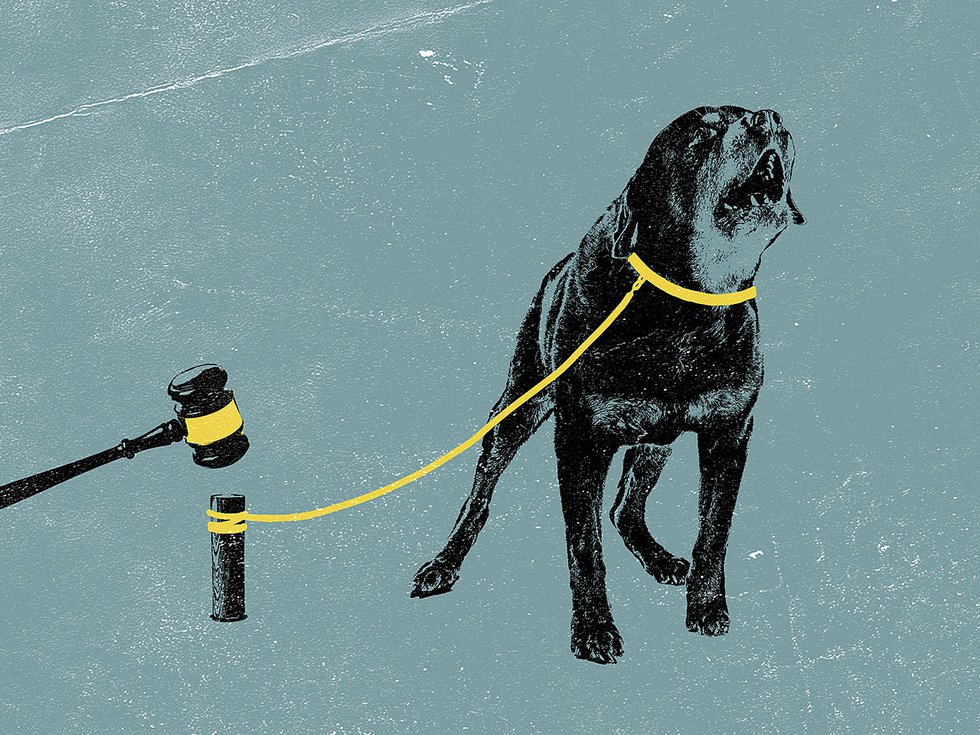Tweak to dog-bite law improves public safety – Isthmus


In our house, we call it Stella’s law.
On April 16, with no discussion, the Madison Common Council unanimously approved an ordinance amendment to allow humane officers to require that dogs who bite other dogs or people be physically restrained when outside, lest their owners be fined up to $500. Last month, the Dane County Board passed a nearly identical amendment. Both are now in effect.
This change was made in part because of what happened to Stella, our much-loved 21-pound rescue mutt. Last year in early May, Stella, then 12, was attacked by another dog as my wife, Linda Falkenstein, Isthmus associate editor, and I were walking with her in our north-side Madison neighborhood.
The attack was horrific. A dog that had been left outside unattended with no fence, no leash, no tether, no muzzle, just an electric shock collar that is not meant to be used for aggressive dogs, charged down to the sidewalk and snatched Stella up in his jaws. He was shaking her like a rag doll. I tackled him and somehow managed to make him let go without being bitten myself. His collar came off in my hands.
We spent six horrible hours at the emergency vet. Stella’s wounds took a month to heal. An element of fear has been added to our daily walks.
Humane officers with Public Health Madison and Dane County fined the dog’s owner a little more than $300 (which he paid, along with Stella’s vet bills) and opened a dangerous animal investigation.
That investigation dragged on for more than eight months and, in the end, the department opted against declaring the dog dangerous, telling his owner this might happen next time. This is a common result: Out of the 30 dangerous dog investigations that the public health department conducted in 2023, only five led to dangerous dog determinations.
The standard for declaring a dog dangerous is high, because it gives health authorities the ability, in some cases, to order that the animal be euthanized. But absent a dangerous dog determination, the department lacked the authority to take less drastic action, such as requiring that an animal be physically restrained.
The dog that attacked Stella has been involved in at least four biting incidents since 2021. In the three other cases, a person was bitten while trying to intervene in a dog-on-dog altercation. Another dog living in the same house, a female, attacked a neighbor’s dog last December; a month later, that dog was stabbed to death by her owner with a kitchen knife after she attacked two people in the residence. It was the only way to make her let go.
Despite all of this, the health department felt the high standard for declaring a dog dangerous had not been met. And so he was still being allowed outside without supervision or physical restraint, terrifying the neighbors who already experienced one attack from a dog in that home.
After I wrote about the attack on Stella in Isthmus and the Cap Times, Tag Evers, a Madison alderperson (and friend), met with environmental health supervisor John Hausbeck and Madison Assistant City Attorney Marci Kurtz. Together, they devised an ordinance tweak that would let humane officers require that dogs who bite people or other dogs be physically restrained while outside on their owners’ property, and not just with an electric shock collar.
The proposed amendment came before the Board of Health for Madison and Dane County on April 3. Hausbeck spoke in favor. “This ordinance revision will not solve all problems we have with aggressive animals or irresponsible animal owners,” he told the board. “However, it does give us another tool to protect public health and safety.”
Linda and I both testified in support of the amendment. Evers was on hand to answer questions. When a board member stated, “This strikes me as a ‘one strike and you’re out’” situation, Evers agreed, saying it was “not too onerous to require dogs that attack be restrained” and “even if it’s one incident, staff should have the discretion to require restraints.”
The board unanimously recommended that the change be approved on the city and county level, which is what happened.
Under the revised ordinance, explains a health department handout, humane officers can still “consider all factors before determining the appropriate action to take,” and any fines can be challenged in court. Hausbeck said a bite means when skin is broken. The ordinance does not apply if a dog kills a chipmunk or squirrel, or if it is provoked to bite by being mistreated.
While one might question why it took the intervention of Ald. Evers to get the health department to address a known problem, Hausbeck did throw his support behind the cause. The new rule, he confirms, is now being applied to “a handful of situations” where the department deems it appropriate.
Sadly, the law is not retroactive, so the dog that attacked Stella will have to attack again before the department can mandate physical restraints when outside the home. I’m told that, in recent weeks, he has often but not always been leashed while outdoors.
Stella is almost 14 now, and a health issue, we expect, will soon take her from us. But we are grateful to the city and county officials for making something good come out of the bad thing that happened to her. That’s how government is supposed to work.
Bill Lueders, Isthmus news editor from 1986 to 2011, is a writer in Madison.




